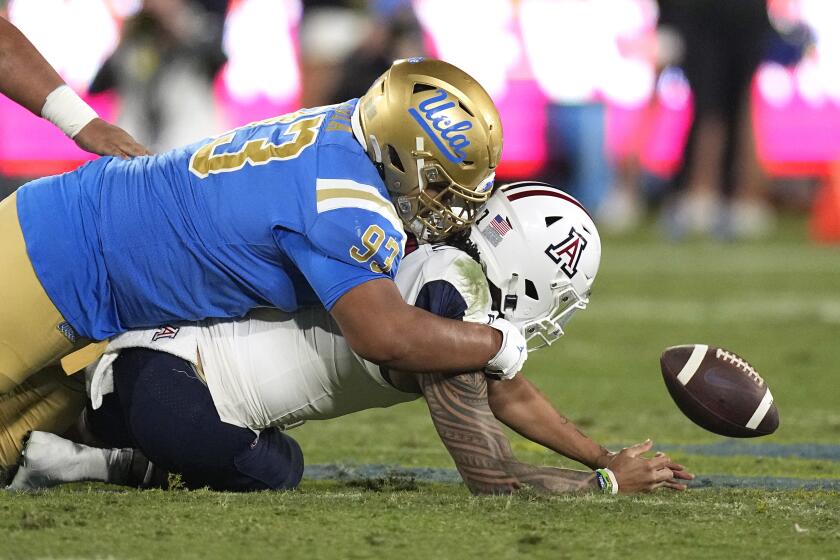To save L.A.’s Coliseum, sell it
The Los Angeles Memorial Coliseum was declared a state and National Historic Landmark in 1984. Its architecture and history are unparalleled. It is also one of the oldest sports stadiums in use in the nation.
And as any USC Trojan fan can tell you, the Coliseum is in urgent need of major repairs and upgrades to ensure that sports fans are safe and enjoy state-of-the-art amenities as they cheer on their favorite team. After all, history alone doesn’t sell tickets or bring back world-class teams.
There is a way to turn the Coliseum into a viable site for a 21st century winning sports team and, at the same time, offer a financial boost to the facilities’ owners: Sell all or part of it.
But that won’t happen unless state legislation requires the Coliseum’s sale because the three governments that oversee the facility will engage in a turf war over its control and any money derived from it.
Currently, any change to the facility must have the approval of the city of Los Angeles, the county of Los Angeles and the state of California, which jointly own the site. All three are deep in the red, which makes the possibility of reinvigorating the Coliseum to bring in new sports teams and provide a positive experience for the supporters of the facility’s sole remaining long-term tenant -- the USC Trojans -- highly unlikely.
In fact, the Coliseum Commission, the contracted managing organization for the site, went through contentious negotiations last year before finally signing a contract to retain the Trojans as tenants. Even for college football, the Coliseum is becoming obviously inadequate, able to accommodate only about two-thirds of the fans who want to come out to support USC.
So, under these circumstances, it’s astounding that the Coliseum Commission last year rejected USC’s $100-million investment proposal for the stadium in exchange for a master lease that would have given the university the right to play at and operate the facility.
As one sportswriter said: “Why on Earth would a government body walk away from a $100-million private investment for public benefit?” Obviously because it is made up of people who are out of touch with the fiscal realities of the state and local governments, and even sports teams.
That’s why I have sponsored legislation, SB 29, which would dissolve the Coliseum Commission and authorize the state to work with the city and county of Los Angeles to sell all or part of the Coliseum grounds. Again, it will take an act of the Legislature to get the commission, which represents the three-headed government monster controlling the facility, to release its grip on what is clearly an inadequate and frequently underused facility. The governments embroiled in the struggle for ultimate control will not let the Coliseum go without an order to do so.
The bill would provide an opportunity not only for the real “owners” of the Coliseum -- the Trojans -- to step up and take control of the facility, it also would provide badly needed revenue to the governments that currently control but can’t adequately maintain the site.
It’s in no one’s interest to allow the Coliseum to continue to drift into decay. And, although the USC lease signed last year requires the university to make substantial investments in the facility in exchange for the right to use it, it’s still not clear how the Coliseum will continue to function in this era of high-tech, high-cost sports without a solid infusion of cash.
By releasing their hold on the facility, the local governments and the state could not only give control of the site to those who love and respect it best, they also could address some of their own fiscal problems.
More to Read
Get our high school sports newsletter
Prep Rally is devoted to the SoCal high school sports experience, bringing you scores, stories and a behind-the-scenes look at what makes prep sports so popular.
You may occasionally receive promotional content from the Los Angeles Times.






